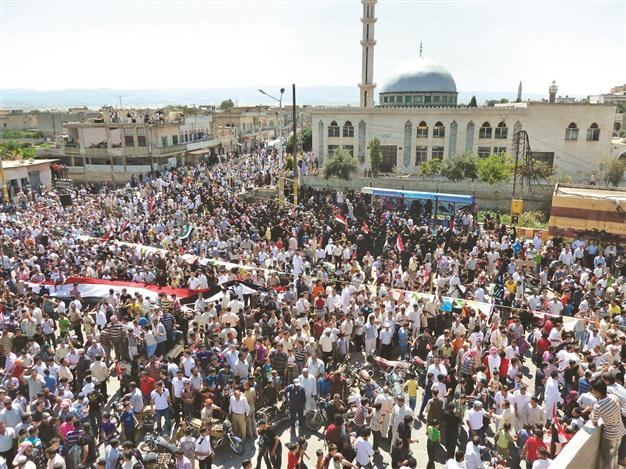Two day peace deal fails to stop violence in Syria
DAMASCUS

Demonstrators protesting against Syria’s President Bashar al-Assad gather in Hula, near Homs in this undated handout released Nov. 4, 2011. REUTERS photo
Syrian security forces killed at least eight people and wounded dozens more as they cracked down on protests after Friday prayers, activists said, casting doubt on whether an Arab League plan can end months of bloodshed.The bloodshed was a blow to the 22-nation Arab League, which announced Nov. 2 that Damascus agreed to a broad plan that included an end to violence against demonstrators. Washington warned signs were not encouraging that the government really intended to bring an end to its deadly crackdown on dissent after troops killed 20 civilians Nov. 3, the first day the hard-won agreement came into effect.
Opposition groups called for a large turnout in Nov. 4’s protests to test whether the regime would in fact refrain from using deadly force. Gunfire erupted shortly after the protests began, in the same pattern as previous Fridays over the past eight months.
“This regime is not serious about ending its brutal crackdown,” said Mustafa Osso, a Syria-based human rights lawyer. “Today was a real test for the intentions of the regime and the answer is clear to everyone who wants to see.”
Thousands of protesters braved cold and rainy weather to stage anti-Assad demonstrations. “Arab League, beware of Bashar Assad,” read one banner carried by protesters in Homs. “Which dialogue are you talking about?” read another.
Most opposition leaders refuse to meet with al-Assad because of his crackdown, which has killed about 3,000 people in nearly eight months of protests, according to the United Nations. Instead, protesters have demanded that al-Assad resign.
Activists said Nov. 4’s rallies were largest in Homs, Syria’s third-largest city, which is home to 800,000 people and has been the scene of the deadliest crackdown.
A resident of Homs said mass marches formed after Friday prayers in most districts of the city, despite the heavy security presence and violence of the past days. Demonstrations were also reported in the southern province of Daraa and in the eastern cities of Deir ez-Zor and Qamishli.
[HH] Amnesty for protesters
While clashes continue on the ground, the al-Assad government unexpectedly offered an amnesty to anyone with weapons if they reported to police within a week “as long as they did not commit any crimes of killing,” state television reported.
The gesture did not appear to be part of the Arab League plan under which the army would leave turbulent cities, political prisoners would walk free and a dialogue with the opposition would begin within two weeks.
“The Interior Ministry invites those who carry arms, who sold them, distributed them, bought them or financed their purchase and who have not committed any murder to turn themselves in and surrender their weapons to the nearest police station in their district ... from Saturday, Nov. 5 to Nov. 12,” the report said.
Al-Assad has twice ordered general amnesties since the conflict erupted, the first time on May 31 for all political prisoners, including the banned Muslim Brotherhood. In June the president issued a second decree “granting a general amnesty for crimes committed before June 20, 2011,” the state-run SANA news agency reported at the time.
















